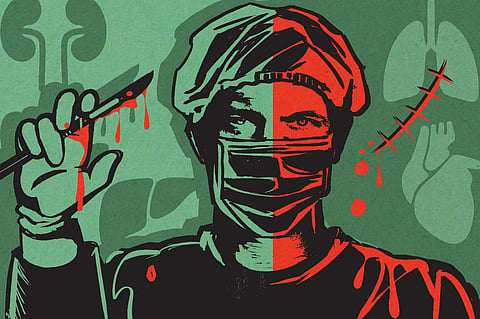

A Kerala court recently issued a summons to Lakeshore Hospital, Kochi, for allegedly transplanting the liver of a brain-dead patient to a foreign national. The court has found prima facie evidence against the hospital and some of its doctors who allegedly harvested the kidneys and liver, violating the Transplantation of Human Organs (THO) Act, 1994. The incident happened in 2009, and if not for the vigilante activity of one Dr Ganapathy, who doggedly pursued the case, it would have gone unnoticed as one among many such incidents in our country.
Even now, the case is only in the preliminary stage and there is a long way to go before a verdict is passed. It, however, confirms the nightmares we have about hospitals. We often read about illegal organ transplantation in different parts of the country. In 2016, there was the case of T Rajkumar Rao of the infamous Apollo kidney case, and he was arrested again in 2019 when the details of an extensive underground network of organ trafficking came to light. Dr Amit Kumar, who gained notoriety in the Gurugram kidney racket of 2008, was arrested again in 2017 in Dehradun. These cases are just the tip of the iceberg; most of us would have heard about such a nefarious organ black market in India.
According to the World Health Organization, India is now the leading kidney exporter in the world. More than 2,000 Indians sell their kidneys legally, most of which go to wealthy foreigners. The illegal smuggling of organs from the country is estimated to be many times this official number. The irony is that around three lakh domestic patients are waiting desperately for cadaver donations at any given time. The gap between demand and supply is vast, and after India tightened the rules on organ exchanges in 2008, the black market has grown to enormous proportions.
The approximate number of brain death cases is around 80,000 annually, but less than 1,000 cadaver organ donations happen yearly. This accounts for less than 5 per cent of total organ transplants in India. Superstition, religious beliefs, lack of awareness and inadequate facilities result in lost life-saving opportunities through organ donation in a country where many people are waiting for a transplant. The poor are disproportionate victims of this situation. The participation of government-run hospitals in transplant operations is abysmally low.
Private hospitals charge astronomical fee for the same, much beyond the reach of the common man. The system is skewed so that the poor donate the organs at public hospitals or illegally sell them, and the rich receive them at five-star hospitals. As long as life-saving organs are not available even on a high payment and poor people are willing to sell theirs to make ends meet, it will be impossible to curb black marketing through law. Either party is in dire need, and there is only so much policing any country can do. But what is scary is how many unscrupulous private hospitals and doctors harvest organs from unwilling donors and even resort to murder for profit.
With the rapid increase in lifestyle diseases, organ demand will only grow in the coming years. How the India growth story is unfolding and rendering a vast majority poor, the situation will worsen unless safety nets are built in. However unpalatable, the idea of a legal organ market may be considered. If it is legal for a woman to rent her womb and deliver someone else’s child in exchange for money, why should it be against law to sell one’s organ to save another being? Why should the donor and recipient be treated as criminals? The government can regulate the market better and bring transparency.
Organ transplants in private hospitals should only be allowed through open organ markets, and harvesting from brain-dead patients in private hospitals should be banned. There is also an urgent need for specialised transplant hospitals in the government sector where cadaver organ donations will be used to provide free transplants for the poor. If it is ensured that the donated organs of our loved ones, in the unfortunate event of brain death, will only go to the deserving ones and not fatten the pockets of ‘hospital entrepreneurs’, it will encourage more people to donate organs.
Anand Neelakantan
mail@asura.co.in
Author of Asura, Ajaya series, Vanara and Bahubali trilogy